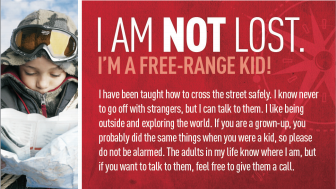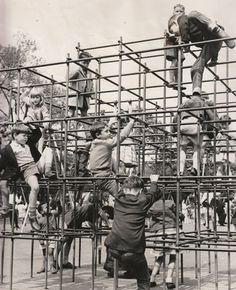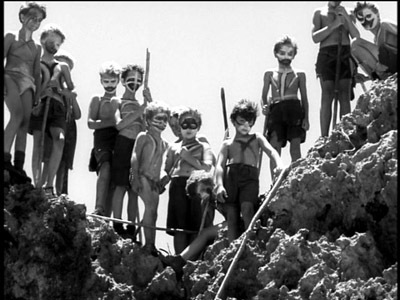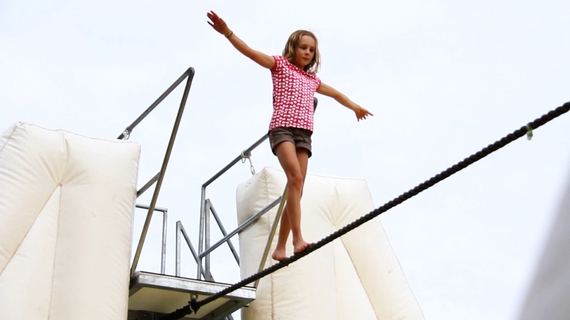
One afternoon last December, a brother and sister, ages 10 and 6, were walking a mile along a six lane avenue just north of Washington, DC. A concerned passerby alerted police. A patrol car soon arrived, picked the kids up and took them home, and alerted Child Protective Services, to investigate the matter. The police asked the kids' dad for identification before releasing them and warned him of the potential dangers his kids faced walking that far unsupervised. The parents were outraged.
The parents' choice to allow their kids to walk home a mile from the park came from a philosophy known as "free-range parenting." The goals of a free-range parent are the same as those of most parents: to raise their kids to cope successfully with life, and if possible, be outrageously happy. Humans have been debating how to get your kid to be a successful adult since we began to speak. For free-range parents, the answer is autonomy and responsibility -- early and often.
Parental polemics are always in season, and this walk triggered the usual flurry of media attention and commentary. The majority opinion was along the lines of: "Down with the nanny-state!" "Fight the power!" And rousing parents to throw off their chains and unleash their kids!
The problem is that critics have identified the wrong enemy. The police and CPS are not the enemy. They serve us and our fears, in this age of amber alerts and public sexual predator registries. In this case they responded to a civilian report, and if they erred, it was on the side of caution.
My experience as a psychologist working with families for over 30 years is that Free Range parenting is easier said than done. The spirited response to this story illustrates that large numbers of parents espouse free range, but a lot of empirical data --and the parade of anxious parents through my office -- strongly suggests most of us are unable to land our helicopters. How we got here and why it's so hard to get anywhere are difficult questions. But the "just do it" call to action isn't enough to get parents to change.
One obstacle is the tendency of a reactive movement such as free-range parenting to be framed as an "all or nothing" commitment. Either you let your children romp and roam freely or you're a nervous "wuss" of a parent. "You don't let your kid ride the subway to school? How does it feel to crush an independent spirit?" "You are checking on your kids playing in the park? Do you want them to live in the basement when they're 40?" But the truth is, kids can help in the yard tomorrow.
Growing up in Queens, NY in the '60s, I was allowed to freely roam the range from the age of 6. I wandered as far as my feet and Sting-Ray bike (with "motorcycle" handlebars and a "banana" seat) could take me. And I loved to travel -- Aqueduct Racetrack, Rockaway, Kennedy (then Idlewild) Airport -- destinations I sensed I need not burden my mom by telling her before or after. Two recent arrivals from Italy, brothers who loved to fight in tandem, routinely ambushed me. Having not yet mastered the idioms of the street, Angelo taunted me: "I starta it-a, you-a feeneesh-a it!" I had to chuckle even though I knew I was about to get my ass kicked. I remember wishing for some adult interference then.
Transfixed at the sight of a dead junkie I had just come upon in an abandoned car, I studied the body way longer than I should have. That ghastly image is among the clearest memories of my childhood. I wish a responsible adult had intruded to pull me away sooner. And when a bunch of us were playing cowboys and Native Americans and a member of the attacking tribe started shooting real, competition grade arrows at us, I would have warmly received a little police meddling. Making myself as flat against the ground as possible, the "thwock-boing!" sounded just above as the shaft found its mark in a wooden shed door.
I have often been as drunk on the irrational exuberance of my idyllic childhood as the next boomer. But I must admit upon reflection, the free-range I grew up with felt sometimes like an urban Lord of the Flies.
I am all about the benefits of home on the free range, but have learned that even parents who keenly wish to change their behavior have a difficult time. There are many complicated reasons why the trend has been for parents to decrease their kids' freedom compared with their own childhoods. Police and child welfare configure to changing cultural tides. When they pick up and deliver a lost, disabled, or mentally ill youngster, police officers are seen as heroic. The cops who rounded up the two free-range kids in Silver Spring made the kind of judgment call they make all day. Choices like this reflect shifting cultural norms, values and imperatives ("The children! Who will protect the children?"). Police and anyone working with children must factor in the consequences of not heeding such priorities.
There are many reasons that parents resist permitting their kids greater freedom. Greater mobility of the U.S. population resulted in less availability of grandparents, aunts, uncles, and older cousins who used to live nearby and provide help and balance. Parents are much more likely to have fewer children at an older age, inducing a greater sense of urgency to accomplish their goals for their kids with less time available to do so. Infusions of parental anxiety by ubiquitous news and social media outlets that dig up tragic incidents that befall children in all corners of the globe. Missing children on milk cartons are a walk in the park compared to the ways parents can be terrorized today.
Working with parents learning to fire-walk this path, I learned to offer simple (not to be mistaken for "easy") tactics:
1. Discuss with others -- co-parents, kids, smart friends -- which principle is guiding your choice at any given time: "Keep 'Em Worry-Free," the sense that parental success means kids who are happy 24/7, or "Planting Seeds of Efficacy," the quest to encourage problem solving, autonomy, and the ability to cope with failure.
2. Realize that it's not a fair race. It's not even a race at all. Natural abilities are not evenly distributed among children. It takes time and care to identify the goals that help your kid increase independence and responsibility. Think of your kid's life as like a video game -- she encounters a challenge, a failure, the same challenge, then success! Then the next challenge, failure, the challenge, success! and so on. Your kid's passage through increasingly difficult challenges in life can build a similar sense of accomplishment -- and clear successes help parents get engaged and persist, too.
3. Often one parent is more worried about dangers than another. It may be helpful to examine the division of parenting labor -- are there recurrent situations that may benefit from trading tasks? Should laid-back mom be the one to monitor tree-climbing instead of freaked-out dad?
4. Learn to identify the difference between "I can't vs. I won't." If your kid seems to have the chops to succeed in a given situation, but complains "I can't," she's probably feeling a lack of confidence because she hasn't had successes like this before. Feeling competent is a mash-up of The Right Stuff: having the specific skills necessary, knowing how to tell whether she is doing well or not, being able to manage feelings like anxiety and frustration, and, lastly -- is she motivated to try?
5. Not sure? Consider this: Has your child ever succeeded at a similar task before with minimal concrete assistance? Do you think he could do it if you offered an irresistible incentive? If the answer to these questions is yes, and you are reasonably sure no miracle was involved, then your child likely has the skill set to get the job done.
6. "Gradual" is a good word to keep in mind as you start reducing the number of rescue missions. Children need to be eased into the transfer of power. For example, you could have no search and rescues on Tuesday and Thursdays as a phase-in. This is useful for both parties, actually, as parents too have to develop the stomach for the job.
7. Remember that mild anxiety is an internal prompt to pay attention. Children can learn to channel it into paying attention to what they're doing. But if parents are responsible for 100 percent of the anxiety, there is little opportunity for their kid to learn she can feel anxiety and survive. Anxiety can be managed; your kid will learn that taking action is a constructive ways to lower their stress later in life. In fact, there is evidence that the more times a child is separated from parents before age 9, the less likely they are to have separation-anxiety symptoms at age 18, suggesting a kind of "inoculation effect" of leaving kids alone.
8. If this feels like too much, remind yourself that while children need a taste of danger to develop coping skills, how they get those tastes does not actually require peril. What they need is a sense of risk. For example, when kids pretend to fight pirates, they require neither swords, flintlocks nor even pirates. The excitement and risk are created in imagination. Whether the weapons are toys or merely sticks, the effect is the same.
If your child struggles with social, learning or health issues the advice "just do it" with regard to free-ranging is likely to sound even more ludicrous. For these kids, the transition to adolescence can be particularly tough. Just to survive childhood, its likely that he needed lots of hands on organization, social coaching, and frequent rescue missions. But those kids can learn from challenges and failures, too.
The mom of the free range kids mentioned earlier told the Washington Post: "The world is actually even safer than when I was a child, and I just want to give them the same freedom and independence that I had -- basically an old-fashioned childhood. I think it's absolutely critical for their development -- to learn responsibility, to experience the world, to gain confidence and competency."
That is a near ideal perspective to take the leap free-range parenting calls for. It is also not within reach of many of todays' parents. I think they should move in the direction that free-range parenting points to, but it is by no means the only path.
Criticizing others' parenting is as easy as taking candy from their baby. (And don't they know candy is a choking hazard?) Instead of using our words to condemn everybody else's way of raising their kids, can't we all just get along? Let's find ways that really help fellow parents to be less fearful, and offer encouragement and comfort when our kids take risks, when our thoughts whisper "they will survive" as our feelings scream "we are all going to die."



